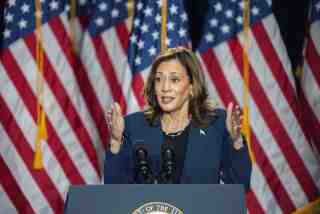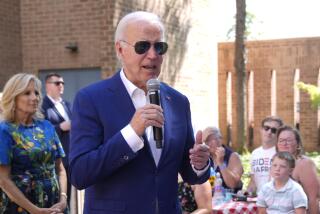Clinton Vows Key Role for Running Mate : Politics: Gore will be an emissary to Congress, Democratic candidate says. They try to stress both their experience and their credentials as outsiders.
LITTLE ROCK, Ark. — Bill Clinton promised Friday to make Sen. Albert Gore Jr. (D-Tenn.) his emissary to Congress should the two of them win the November election--seeking to portray the ticket both as experienced in government and as outsiders to the paralysis that voters have come to despise.
The desire to appear both inside and outside at the same time reflects the difficult dynamics of a three-way contest. Clinton, the presumptive Democratic nominee, must defend himself against President Bush’s chief theme--that Clinton lacks the maturity and experience to be entrusted with the presidency. But at the same time he has to try to capture voters attracted to Ross Perot’s stance as someone apart from a system that has stopped working.
And so, with Gore standing a respectful couple of paces behind him on a stage decorated with a freshly made red, white and blue Clinton-Gore banner, the Arkansas governor used a joint press conference to push his theme that he and his running mate know enough about government to make it work but have enough distance from it to understand why it must work differently.
On the one hand, Clinton said, he and Gore would seek to “shake things up in Washington.”
“I don’t want Al Gore to be the kind of vice president who sits in the United States Senate waiting to vote to break a tie. I want him to break the logjam,” Clinton said. “I’m going to send him to Capitol Hill to take the lead in passing our program.”
As they try to avoid appearing to be just two more conventional politicians, both men repeatedly declined to answer what they termed “political questions”--seeking to avoid public discussions of campaign strategy and tactics, which Clinton and his advisers believe turn voters off.
Clinton insisted that although Gore has been a member of Congress for 16 years, not everyone in Washington should be blamed for the government’s gridlock.
“The crowd that’s been in power for the last 12 years have gotten away with running against Washington, and they are the Washington insiders,” he said.
“I’d be the last person to say that there aren’t people in our party who have also contributed to the paralysis,” Clinton added. “But I don’t think you can put that at Al Gore’s feet.”
On the other hand, the governor stressed the experience he and Gore have accumulated, and he made explicit the contrast with Bush’s running mate, Dan Quayle, that Clinton strategists hope voters will make as the campaign continues.
“This is my first decision. That was George Bush’s first decision. I think if we’re evaluated on them, I should be elected President,” Clinton said.
In 1988, Democratic nominee Michael S. Dukakis made the same argument after he chose Texas Sen. Lloyd Bentsen. Although polls indicated Americans had doubts about Quayle, those doubts did not deter them from voting for Bush.
“It’s the one thing we did well four years ago and they did terribly, and in the end it didn’t matter a bit,” said Susan Estrich, Dukakis’ 1988 campaign manager and now a law professor at USC.
Although at ages 45 and 44, respectively, Clinton and Gore would be the youngest major-party ticket in history, “we have worked for the last 12 years in different ways to deal with the problems America now needs a new President to solve,” Clinton said.
“I’m the senior governor in the country now,” he noted, while Gore “has an awful lot of experience and a genuine record of achievement.”
One of the chief factors causing him to select Gore, Clinton said, was that the Tennessee senator had “paid the price of time to work on things that require time and vision and determination to change.”
And that sort of experience will be needed to bring change to the country, Clinton argued. “Even Mr. Perot acknowledges that you have to get change from within,” he said. “Change won’t come without Congress going along. We have a Constitution. He (Perot) has implied that he might like to change it, but for right now, we’ve got a Constitution.
“In the end, you’ve got to make the government work.”
The joint press conference capped a week in which Clinton’s campaign successfully has used his search for a running mate to generate a wave of mostly favorable publicity for his campaign.
The selection of Gore and the mostly positive reaction to the choice dominated the news Thursday--overshadowing to a considerable extent Bush’s participation in the final session of the Munich economic summit.
Friday’s press conference generated a second day of publicity, providing Clinton a favorable lead-in to next week’s Democratic convention.
Not all the reaction has been favorable, of course. The Clinton-Gore ticket has come under criticism from the Democratic left wing for being too conservative and from the White House for being too liberal.
Responding to those criticisms, Clinton and Gore insisted, in Clinton’s words, that they would “make a vigorous campaign for the minority vote” and would not seek to appeal to white, middle-class voters and take blacks and other minority voters for granted.
As part of that campaign, the two men plan to speak today before the national convention of the NAACP in Nashville, an event Perot also plans to address.
But one thing Clinton appears determined not to do is to publicly appear to be placating the Rev. Jesse Jackson. Asked about Jackson’s so-far-tepid support for the Clinton-Gore ticket, Clinton replied with uncharacteristic abruptness. “He’ll just have to make up his mind on that like every other American will,” he said.
As for Republican attacks, the two men sought to ridicule the suggestion that they were too liberal.
“That’s the old dog they trot out every election, and I don’t think it will hunt this time,” Clinton said.
“There are two lines of attack against me,” Gore said. “One is that I’m too liberal, and the other is that I’m too conservative. I guess we’re doing something right.”
More to Read
Get the L.A. Times Politics newsletter
Deeply reported insights into legislation, politics and policy from Sacramento, Washington and beyond. In your inbox three times per week.
You may occasionally receive promotional content from the Los Angeles Times.











